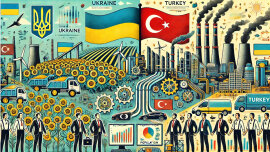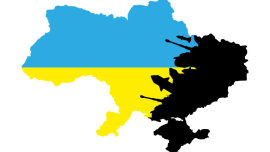IT’S TIME FOR A SANCTIONS COUNTER-OFFENSIVE
The good guys are winning. Ukraine is back to the Russian border around Kharkiv and counterattacking at Kherson.[i] Finland is joining NATO; Sweden is next.[ii] The Moskva lies at the bottom of the sea[iii] and a full Russian BTG sits at the bottom of the Donets.[iv] Vladimir Putin is running out of bodies to fill his BMPs with.[v] Ukrainian citizens are returning home at record rates.[vi] Not only is Ukraine holding their ground, but they are taking back their once occupied land.
If there was a way this war could have gone any worse for Russia, we couldn’t think of it. But our interests transcend this war alone. Authoritarian governments are watching the situation with consternation, and the results of this war may dictate if the coming decades will be more, or less, dangerous for ourselves and our children. It’s not enough to just prevent defeat, but as noted by the U.S. Secretary of Defense, it’s our policy “to see Russia weakened to the degree that it can’t do the kinds of things that it has done in invading Ukraine.[vii]”
There is an economic component to this strategy. Ukraine’s allies, including the United States, United Kingdom, and European Union (collectively “the authorities”) have imposed harsh sanctions against Russia. A set of these sanctions, outlined below, target gateway’s that sanctions targets must use to accomplish their means. Governments should be redoubling their efforts to implement these sanctions, and compliance officers should feel emboldened to take calculated risks to better detect sanctions evasion. But the private sector will need guidance, assurance, and understanding from enforcement agencies and regulators to encourage them to dig deeper.
We are focused on three sets of gateway sanctions which we estimate will have an outsized effect on the Russian government:
- The authorities have banned Russian vessels from U.S., E.U., and U.K. ports, which if well designed and implemented, could undercut Russia’s maritime industry and ability to ship and receive goods.
- The U.S. and E.U. have prohibited the provision of accounting, trust, and corporate formation services to Russia or persons located in Russia. These prohibitions, if properly enforced, may prove transformative in our ability to fight financial crime, even beyond the scope of Russia-related sanctions.
- The authorities have placed export controls on dual-use goods sought by Russia, which will undercut its ability to maintain an effective military, as well as undercut Russia’s technology-related industries.
Except for the latter, none of these sanctions have ever been applied before; and while export controls are not new, they’ve never been targeted so explicitly at another major military power to deplete its armed forces. These are unordinary sanctions which require extraordinary solutions. Implementing them will require a heavier hand than national governments are used to, an expectation that compliance departments may need to repurpose their resources more efficiently, and significantly improved information sharing than has been previously seen.
In this advisory, we examine some of the issues affecting these gateway sanctions, how they can be remedied, and how national governments can seize the initiative to maximize the effects of these sanctions. Our own experience comes from working with both the banking and maritime sectors, and our recommendations outline how agencies can best use these industries to achieve their means.
National authorities also need to recognize that many of these gateway sanctions are new to both the maritime and banking industries, and government agencies will need to prioritize their objectives and exercise patience as industry implements new solutions. Both banks and maritime companies do not have unlimited resources, and the capacity of many compliance departments is already being tested by existing sanctions. With that in mind, we encourage federal and state regulators to keep an open mind about how compliance departments distribute their resources, and that there may be better uses for their employees than simple name screening.
- Closing the Maritime Gateway
With over eight-tenths of goods transported at sea, the maritime industry is a natural gatekeeper for international business.[viii] Banning Russian vessels from ports in Europe and America, if implemented correctly, could be one of the authorities most effective set of sanctions against Russia.
Simply put, banning Russian vessels from these ports drives up the cost of shipping for Russian imports and exports by making them pay substantial markups to charter other vessels to carry their goods.[1][ix] This severely undercuts any profits Russia might see from their exports, increases the costs of imports, prevents Russian vessels from routinely accessing replenishment services (e.g., bunkering, non-emergency maintenance) abroad, limits their range, and raises associated maintenance and insurance costs.
However, there are three major gaps within this approach:
- First, a trio of E.U. members succeeded in watering down the E.U.’s port ban to only cover Russian flagged vessels, but not those which are owned or operated by Russian persons and flagged elsewhere. This effectively neuters the E.U.’s port ban, as almost 90% of Russian owned or operated vessels are flagged outside of Russia. [x] To illustrate this, at the beginning of the war only 21 of Sovcomflot’s (a designated Russian ship operator) 131 active ships were flagged in Russia.[xi]
- Second, while Japan, Singapore, and South Korea have imposed their own sanctions on Russia, they still allow Russian vessels, particularly tankers and LPG carriers, to visit their ports. Japan and South Korea alone account for 12% of Russian oil exports,[xii] while Singapore serves as a key transshipment hub – particularly for ship-born commerce between East Asia and India.
- Finally, the ports have been tasked with a difficult job to enforce these bans and may not have the requisite compliance experience or capacity to assess each visiting ship. For example, prior to Covid the United Kingdom alone saw about 95,000 port calls a year across dozens of ports.[xiii] The technology exists to screen these vessels, their IMO-listed registered owners, and AIS history to determine if they are subject to sanctions, but each port would have to train new compliance staff to handle the task. The due diligence process may encounter a web of shell and front companies masking Russian ship owners or operators, and more experienced investigators may have the due diligence skill sets to quickly peel back the layers of ownership to uncover a sanctions nexus.
|
Recommendations to National Governments Port bans are powerful instruments in the sanctions toolbox because they target transaction gateways (e.g., the maritime industry) and have knock-on effects to the profitability of many Russian industries. To take these sanctions on the offensive, we recommend for national governments:
|
- Shutting off the Incorporation Services Gateway
Sanctions targets frequently use shell and front companies registered in offshore or financial secrecy jurisdictions to evade sanctions. These companies, as well as special purpose vehicles such as trusts (collectively “shell companies”), are designed to obfuscate the role or identity of a sanctioned party so that they may transact clandestinely by avoiding watchlist screening programs and complicating the customer due diligence process. Shell companies have featured heavily in past Russian money laundering schemes, such as the series of “Laundromats” detailed by the Organized Crime and Corruption Reporting Project (“OCCRP”)[xv], and in other sanctions evasion schemes such as those used by North Korean[xvi] or Iranian[xvii] threat actors.
These networks are supported by a bevy of professional services firms, including law firms, corporate secretaries, and corporate formation agents (collectively “incorporation services”) and the private wealth business lines of banks themselves, all of whom assist their clients in setting up structures which hide their identity and evade scrutiny. These companies don’t just benefit sanctions targets, but also more pedestrian criminals, tax cheats, and senior officials who wish to hide the proceeds of their corruption.[xviii]
A new set of sanctions, applied by the E.U. and U.S., set out to address this problem:
- In their fifth package of sanctions, the E.U. prohibited the provision of services to incorporate or maintain trusts on behalf of Russian persons.[xix]
- The U.S. took this a step further and prohibited U.S. persons from providing accounting, corporate formation, or management consulting services to Russian persons[xx] – all of which would be used to incorporate shell companies.
Yes, there are significant gaps in the E.U.’s prohibitions, but even focusing solely on trusts would significantly hurt Russian senior officials and oligarch’s ability to move money anonymously through E.U. banks.[xxi] These prohibitions would also provide a framework for future anti-money laundering efforts, as they could be re-applied to a wider range of sanctions targets or illicit activities.
Enforcing these sanctions will be significantly more difficult than issuing them. Incorporation service firms will not invest in compliance unless they reasonably believe that they could be penalized or designated for their conduct or are challenged by their banks on best practices. OFAC and its E.U. counterparts must move fast, both to issue guidance to the financial community on how to deal with incorporation services,[3] and by issuing both designations and enforcement actions to make a point.
The prohibitions also need to be complemented with more vigorous implementation of financial transparency laws. The United States was listed this year in the Financial Secrecy Index as the top jurisdiction for people to hide their wealth.[xxii] Perhaps the best place to start reform is at one of the country’s largest for-profit anti-money laundering conferences, which is held in a state known for – amongst more flashy things – its ability to incorporate companies anonymously.[xxiii] The E.U. isn’t in a better state either. Two of the index’s other top-10 countries are members of that club after all. [xxiv]
|
Recommendations to National Governments Obtaining compliance from incorporation services will require such firms to reasonably perceive that there is a risk of enforcement action, and for financial institutions to fundamentally rework how they hold accounts for these companies.
|
- Generating better financial intelligence for export controls
The U.S. Bureau Industry of Security (“BIS”), the U.S. agency tasked with enforcing export controls against dual-use goods, has imposed licensing requirements on nearly all dual-use goods going to Russia,[xxv] including both the re-export of those goods or when those goods are incorporated by a third-party into a different product.[xxvi] However, like all things Russia-related, U.S. export controls against Russia are both at a larger scale than any programs before, and uniquely urgent.
Russia’s modern weapon systems rely on high-tech components made in the United States and Europe. For example, the Royal United Services Institute, a think tank, examined several captured or destroyed Russian weapon systems found in Ukraine and noted that many of the subcomponents of these weapons (e.g., internal electronics, sensors) were manufactured “in the US, Germany, the Netherlands, South Korea, and Japan.[xxvii]” With Russia running low on precision munitions[xxviii] and other sophisticated military hardware,[xxix] well enforced export controls may indeed impact Russia’s ability to re-equip its military forces and continue the war in Ukraine.
Ostensibly, BIS’s regulations prohibit the facilitation of unlicensed shipments (“General Prohibition 10”), which would extend to normal banking activities such as processing payments or financing shipments. [xxx] However, the agency has never been clear about how export controls apply to financial institutions. A large part of this is because banks make imperfect arbiters of export laws, which are based on highly technical regulations and require detailed engineering knowledge of a product itself.
This also leads to imperfect compromises. Historically, banks have screened parties against BIS’ various watchlists when conducting trade finance transactions (e.g., letters of credit, documentary collections) and implemented simplistic red flags that looked to see if the invoices or bills of lading mentioned words such as “centrifuges.” As BIS appeared in more headlines, first through enforcement actions against ZTE, a Chinese state-owned company, and then by imposing strict controls on Huawei, a different Chinese company, banks have become more concerned about running afoul of General Prohibition 10 and some have extended the screening of BIS watchlists to their entire customer base.
Financial institutions could provide BIS with a wealth of intelligence – if the agency can convince them to. Banks already maintain large compliance departments designed to detect suspicious activity, and those existing processes could be supplemented to report on possible diversions of dual-use goods. The war in Ukraine lays bare the need for such controls, and BIS should move quickly to capitalize on this sentiment and obtain the bank’s cooperation. However, tapping into this resource will take both time and patience, and BIS (and similar national authorities) will have to prioritize collaboration over compellence, and determine which export controls risks they would want banks to focus on.
Three key issues need to be addressed before the agency can expect that banks will meet their needs:
- The watchlist information provided by BIS could be enhanced to make transaction screening more feasible by providing additional biographical information such as dates of birth and nationalities of individuals, and government issued identifiers (e.g., passport numbers, tax identification numbers) for both individuals and corporations. Currently, only addresses are appended to list entries, and both businesses and individuals can change those easily.
- Many of the entities who make their way to these watchlists have connections with other sanctions programs, such as Iran, North Korea, and now Russia. But these relationships to sanctioned countries are often indiscernible. Providing this information in a program tag[4] would help banks make risk-based decisions towards which entities to screen on the list, and where to focus their due diligence efforts.
- While BIS is understandably concerned about the diversion of a wide array of export items, the agency needs to be able to prioritize a small number of products (less than 30) which financial institutions should be on the lookout for. Banks often obtain the underlying goods in a transaction from a request for information (“RFI”) or because they receive the underlying invoices and bills of lading to confirm a trade finance transaction. This information is generally not from structured data, may contain generic names, and cannot easily be compared to existing ECCN descriptions. This means that a prioritized list of goods would be reviewed under a manual process and needs to be easily understood by investigators.
|
Recommendations for National Governments BIS and similar national authorities should use this moment to better leverage financial institutions to prohibit certain transactions and provide financial intelligence on dual-use goods smuggling networks. To best tap into this resource, we recommend that BIS and similar agencies:
|
[1] For example, these fees reached as high at 1,600% compared to pre-war rates when sanctions were announced.
[2] A large percentage of the world’s ships are registered under flags which are U.S. or U.K. persons. Both Liberia and Marshall Islands, the world’s second and third largest flags respectively, are incorporated in the U.S. The Red Ensign Group, a U.K. organization, oversees both the U.K. flag and flags of the crown dependencies.
[3] The U.S. should aim to issue guidance far in advance of the wind-down period, which ends on 7 June.
[4] For example, OFAC notes the program which an SDN is listed under (e.g., Iran, DPRK3) which gives the screening institution context as to why they are on the SDN list.
[i] The Independent. Ukrainian troops reach Russian border in counterattack near Kharkiv, claims regional governor. 16 May, 2022. Accessed at https://www.independent.co.uk/news/world/europe/ukraine-counterattack-kharkiv-russian-invasion-b2079985.html.
[ii] Rasmussen, Sune Engel. Finland, Sweden Apply for NATO Membership, Breaking Decades of Neutrality. Wall Street Journal. 18 May, 2022. Accessed at https://www.wsj.com/articles/finland-sweden-apply-for-nato-membership-breaking-decades-of-neutrality-11652854966.
[iii] BBC. Moskva sinking: US gave intelligence that helped Ukraine sink Russian cruiser – reports. 6 May, 2022. Accessed at https://www.bbc.com/news/world-us-canada-61343044.
[iv] Altman, Howard. Debacle On The Donets: How Russian Forces Got Obliterated Trying To Cross A River. The War Zone. 12 May, 2022. Accessed at https://www.thedrive.com/the-war-zone/debacle-on-the-donets-russian-forces-got-obliterated-trying-to-cross-a-river.
[v] Kofman, Michael and Ryan Evans. Ukraine’s Military Advantage and Russia’s Stark Choices. 27 April, 2022. Accessed at https://warontherocks.com/2022/04/ukraines-military-advantage-and-russias-stark-choices/
[vi] Beaubien, Jason. Some Ukrainian refugees in Poland are now starting to return home. NPR. 5 May, 2022. Accessed at https://www.npr.org/2022/05/05/1096943884/some-ukrainian-refugees-in-poland-are-now-starting-to-return-home.
[vii] Ryan, Missy and Annabelle Timsit. U.S. wants Russian military ‘weakened’ from Ukraine invasion, Austin says. Washington Post. 25 April, 2022. Accessed at https://www.washingtonpost.com/world/2022/04/25/russia-weakened-lloyd-austin-ukraine-visit/.
[viii] United Nations Conference on Trade and Development. Review of Maritime Transport 2018. 3 October, 2018. Accessed at https://unctad.org/webflyer/review-maritime-transport-2018.
[ix] See e.g., See e.g., Bockmann, Michelle Wiese. ‘Self-sanctioning’ tankers drive Russia charter rates 1,600% higher. Lloyds List Intelligence. 4 March, 2022. Accessed at https://lloydslist.maritimeintelligence.informa.com/LL1140063/Selfsanctioning-tankers-drive-Russia-charter-rates-1600-higher.
[x] Based on data collected by the International Maritime Organization. This count does not include vessels whose ultimate beneficial owners are Russian, but their registered owners and operators are not.
[xi] Data provided by Pole Star Global.
[xii] International Energy Agency. Oil Market and Russian Supply. Accessed at https://www.iea.org/reports/russian-supplies-to-global-energy-markets/oil-market-and-russian-supply-2.
[xiii] Department of Transportation. UK Port Freight Statistics: 2019. 12 August, 2020. Accessed at https://assets.publishing.service.gov.uk/government/uploads/system/uploads/attachment_data/file/908558/port-freight-statistics-2019.pdf.
[xiv] Osbourne, Stephen and Clara Guest. The UK’s Russian Ship Ban and the Need for Effective Solutions for UK Ports. 14 April, 2022. Accessed at https://rusi.org/explore-our-research/publications/commentary/uks-russian-ship-ban-and-need-effective-solutions-uk-ports.
[xv] See e.g., OCCRP. Laundromats Explained: How Shell Companies Are Used to Launder Money. 24 September, 2019. Accessed at https://www.occrp.org/en/laundromats/.
[xvi] Lehren, Andrew and Dan De Luce. Secret documents show how North Korea launders money through U.S. banks. NBC News. 20 September, 2020. Accessed at https://www.nbcnews.com/news/world/secret-documents-show-how-north-korea-launders-money-through-u-n1240329.
[xvii] OCCRP. The Quiet Man in Stockholm Who Laundered China’s Oil Money for Iran. 24 August, 2020. Accessed at https://www.occrp.org/en/investigations/the-quiet-man-in-stockholm-who-laundered-chinas-oil-money-for-iran.
[xviii] For an infamous example, see e.g., OCCRP. The Panama Papers. 3 April, 2016. Accessed at https://www.occrp.org/en/panamapapers/. For a more recent example, see e.g., OCCRP. The Pandora Papers. 3 October, 2021. Accessed at https://www.occrp.org/en/the-pandora-papers/.
[xix] Official Journal of the European Union. L 111. 8 April, 2022 §5(m)(1).
[xx] See e.g., Office of Foreign Assets Control. Determination Pursuant to Section 1(a)(ii) of Executive Order 14071. 8 May, 2022.
[xxi] For example, see e.g., Woodman, Spencer. How a network of enablers have helped Russia’s oligarchs hide their wealth abroad. International Consortium of Investigative Journalists. 2 March, 2022. Accessed at https://www.icij.org/investigations/russia-archive/how-a-network-of-enablers-have-helped-russias-oligarchs-hide-their-wealth-abroad/.
[xxii] Shepard, Damian. World’s Top Enabler of Financial Secrecy Is the United States. Bloomberg. 16 May, 2022. Accessed at https://www.bloomberg.com/news/articles/2022-05-16/world-s-top-enabler-of-financial-secrecy-is-the-united-states.
[xxiii] The Nevada Independent. Why Nevada doesn’t care where the money comes from and never will. 27 April, 2017. Accessed at https://thenevadaindependent.com/article/nevada-doesnt-care-money-comes-never-will.
[xxiv] Mansour, Mark Bou. US tops financial secrecy ranking as G7 countries upend global progress on transparency. Tax Justice Network. 17 May, 2022. Accessed at https://taxjustice.net/press/us-tops-financial-secrecy-ranking-as-g7-countries-upend-global-progress-on-transparency/.
[xxv] Bureau of Industry and Security. Rules Affecting the Export Administration Regulations. 2022. Accessed at https://www.bis.doc.gov/index.php/federal-register-notices#fr12226.
[xxvi] See e.g., 15 CFR § 743.3 (a) (1) - (4). See also 15 CFR § 743.9
[xxvii] Watling, Jack and Nick Reynolds. Operation Z: The Death Throes of an Imperial Delusion. RUSI. 22 April, 2022, at 12.
[xxviii] Foy, Henry and Felicia Shorts. Russia running short of precision missiles, say western officials. Financial Times. 29 April, 2022. Accessed at https://www.ft.com/content/f81234cc-cd05-45e8-9dc0-3219b8886490.
[xxix] See e.g., Mitzen, Stijn, J. Kemal, D. Janovsky, and J. Janovsky. Attack On Europe: Documenting Russian Equipment Losses During The 2022 Russian Invasion Of Ukraine. Oryx. Last accessed on 19 May, 2022. Accessed at https://www.oryxspioenkop.com/2022/02/attack-on-europe-documenting-equipment.html.
[xxx] 15 CFR § 736.2 (10).

























